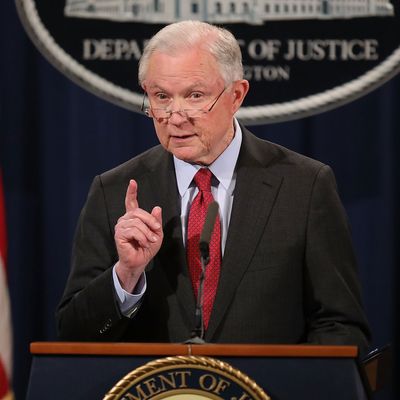
Jeff Sessions is out. The attorney general resigned on Wednesday afternoon, and President Trump swiftly announced that Sessions would be replaced, at least in the interim, by his chief of staff, Matt Whitaker. Whitaker kept a low profile as a public official; his antipathy for the Mueller investigation is probably his most immediately salient characteristic. “I could see a scenario where Jeff Sessions is replaced, it would recess appointment and that attorney general doesn’t fire Bob Mueller but he just reduces his budget to so low that his investigations grinds to almost a halt,” Whitaker said on CNN in 2017. As the Washington Post noted on Wednesday, it’s possible that Whitaker only meant to speculate, rather than call for a specific course of action. But there’s plenty of evidence to assume he meant to do the latter.
Sessions, famously, had displeased his master by recusing himself from the Russia investigation, and for not taking a harder line with Rod Rosenstein’s oversight of the Mueller investigation. Last July, in an interview with the New York Times, Trump said he never would have appointed Sessions had he known that the attorney general would recuse himself. Trump was also angered by what he saw as Sessions’s insufficient enthusiasm for investigating and prosecuting the president’s political opponents.
In one of his customary, disjointed Twitter threads, the president railed at Sessions in August.
Trump, it seems, could wait no longer. In his resignation letter, Sessions states that he has resigned at Trump’s request. The timing is suspect. The GOP, after all, just lost control of the House of Representatives, which leaves Democrats in control of the House Oversight Committee.
There is a certain grim justice to Sessions’s summary dismissal. Of all Trump’s Cabinet-level appointees, Sessions often appeared the most ideologically aligned with the president. Sessions, like Trump, is committed to the war on drugs, even if he does not publicly engage in Trump’s Duterte-style preference for executing drug dealers. Vox reported in January that Sessions had tasked “prosecutors with imposing tougher prison sentences on even low-level drug offenders,” remained indefatigably opposed to the legalization of marijuana, and reduced federal oversight of the police, and shifted the DOJ’s priorities instead to helping police crack down on a mythical wave of violent crime. Sessions’s views on race also aligned with those of Trump. The Senate refused to confirm him to a federal judgeship in 1986 after several black officials reported his use of racist language in his role as an Alabama prosecutor.
On immigration, too, Sessions and Trump marched in lockstep. Sessions unilaterally ruled that domestic violence and gang violence would no longer be considered grounds for asylum, and, as Adam Serwer wrote for The Atlantic in 2017, praised the Immigration Act of 1924, which forced strict caps on the number of immigrants allowed to enter the U.S. by nationality, and mostly barred immigration from Asian nations, including Japan. The ACLU noted in October that Sessions, in a quiet, if particularly sinister move, systematically “upended decades of immigration court practice by holding that immigration judges lack the power to end a case with so-called ‘administrative closure.’” The practice had allowed immigration judges to use their discretion in removing certain cases from their dockets when, in the words of the ACLU, “there was no reason for a case to move forward.” With administrative closure off the table, immigration dockets swelled beyond the court system’s capacity to address them in a timely manner. If there is an immigration crisis, it has nothing to do with the migrant caravan still hundreds of miles from the American border and is instead a human-rights debacle partly of Sessions’s making.
But Sessions’s alignment with Trumpism was not enough to save his job. Trump values personal loyalty, and clearly considered Sessions’s recusal a slight. Ideological loyalty, which Sessions seems to possess in spades, ranks somewhat lower on the president’s list of priorities. This not to suggest that Trump himself lacks ideology — but he consistently acts out of self-interest, and that’s what cost Sessions his job. Trump is desperate to stop the Mueller investigation, and believes Whitaker, or some other, yet-to-be-announced candidate will act where Sessions did not. Kris Kobach, who just lost his race for Kansas governor and who shares with Trump a prejudice toward immigrants, is a possible replacement.
Regardless of who replaces him, Sessions’s legacy will continue to shape both the Department of Justice and the Trump administration long after his departure. As attorney general, Sessions helped ratchet the culture war up to new and uniquely repressive levels. Sessions proved particularly hostile to trans rights, by reversing an Obama-era memo that implemented some workplace protections for trans people. His drug policies and immigration policies directly harmed thousands, and the damage he inflicted will not disappear with his departure. And then there’s Stephen Miller. Before Miller helped formulate the administration’s family separation policy for migrants, before he helped polish the White House’s nationalist rhetoric to a pale sheen, he worked for Sessions. Sessions might be out of government, but his legacy will haunt American politics for a long time.






























